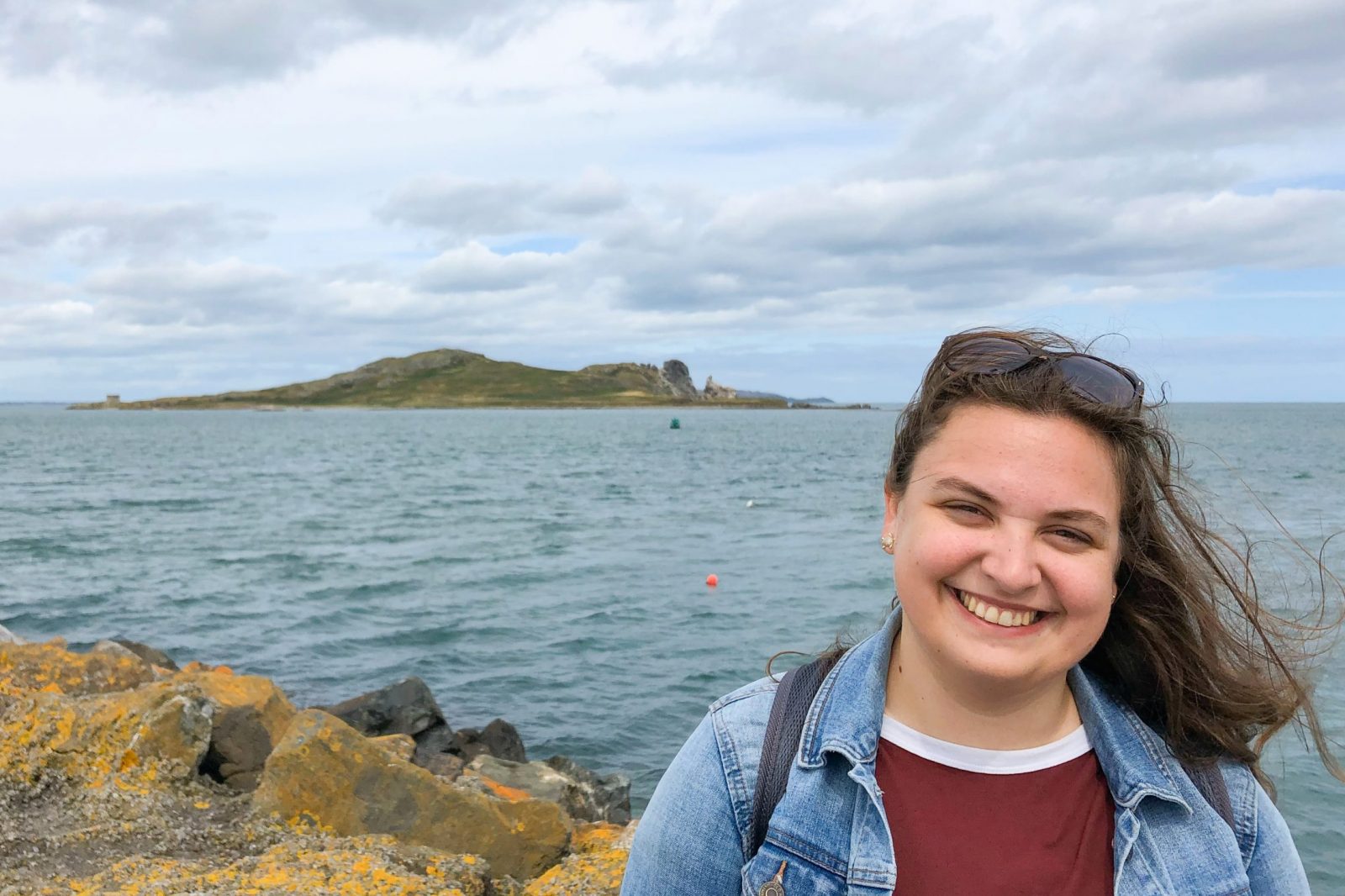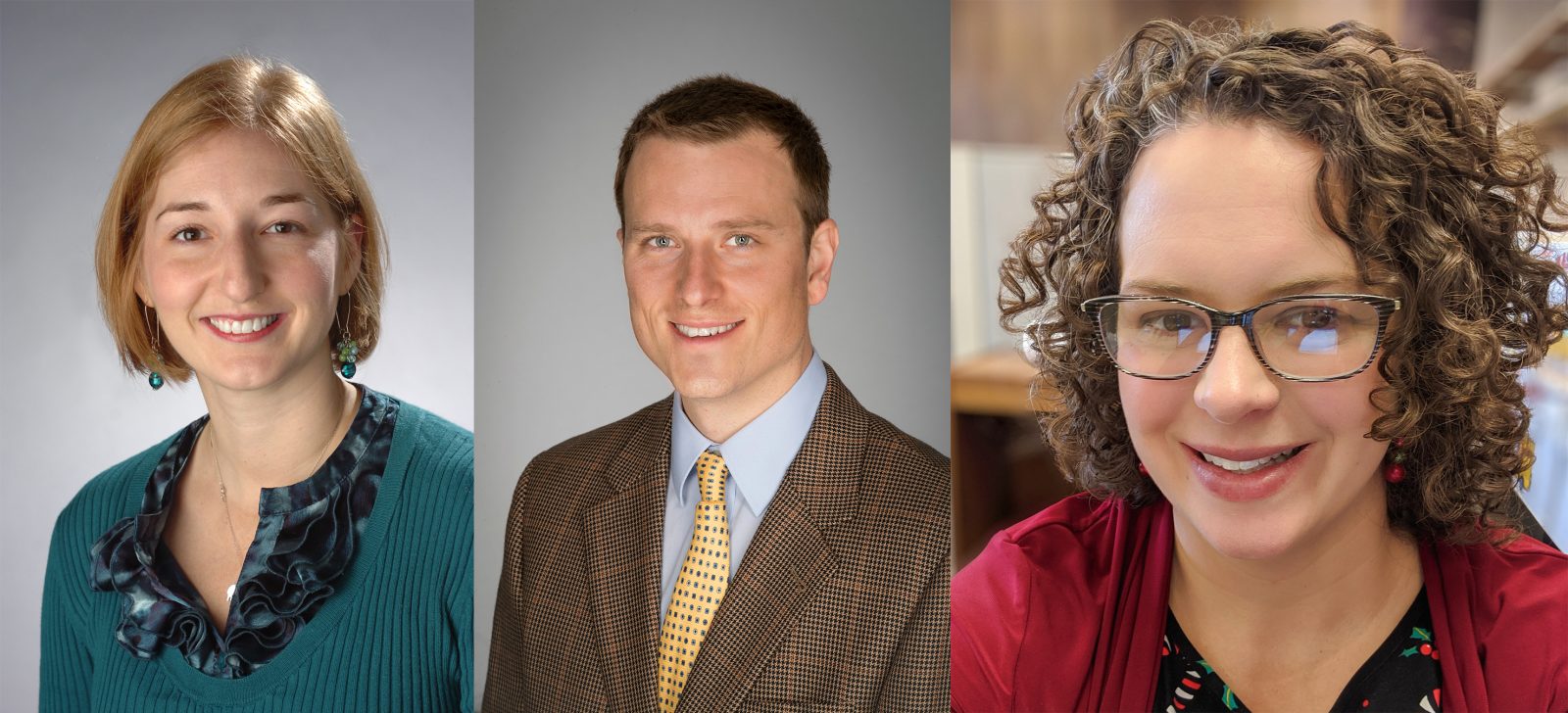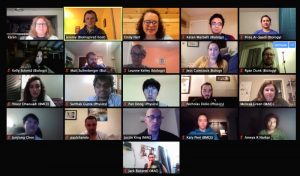The BioInspired Institute’s new microcredentialing program gives graduate students and postdocs valuable communication and management skills for success in competitive job markets.

Julia Zeh is a model doctoral student—a Columbia-trained biologist whose expertise in ecology and animal behavior has earned her a prestigious Department of Defense fellowship. But like most soon-to-be graduates, she needs marketable skills to land a job.
“Being a scientist is more than doing research and conducting experiments,” says Zeh, a member of the biology department in the College of Arts and Sciences. “It’s essential for us to be good communicators, to share what we do and why it matters.”
Enter the BioInspired Institute, whose new professional development program helps postdoctoral researchers and graduate students like Zeh become career-ready. The program emphasizes real-world competencies, such as critical thinking, creative problem-solving and effective communication, which employers value but can’t always glean from a job candidate’s CV.
Integral to the program is “microcredentialing,” a new model of professional learning taking the academy by storm. Microcredentials are nontraditional learning initiatives that enable students to acquire and demonstrate specific competencies en route to their degree. (Working professionals also use them to enhance their job portfolio.) Most microcredentials offer rewards in the form of digital badges, upon completion of workshops focusing on specific skills.
Zeh is wrapping up a graphic design badge, while pursuing another in research skills and scholarly publishing. “The skills I’m gaining range from figure and poster design, to data tools and citation management, to professional networking,” says the aspiring biology professor. “The program makes me more competitive, not to mention a better scientist.”
That’s the goal, admits M. Lisa Manning, BioInspired’s founding director. Since the institute opened last year, she has helped weave microcredentialing into the University’s learn-and-work ecosystem.
So far, more than 100 people have enrolled in the campus-wide program, designed to propel them into the workforce.
“STEM [science, technology, engineering and mathematics] students have professional development needs that are different from those in other graduate disciplines. Many of these needs are under-taught,” says Manning, citing, as examples, data management, image analysis, poster presentations and literature searches. “Generalizable skills, such as writing, presenting and project management, are also prized.”
Maxx Swoger, a second-year Ph.D. student in physics, says BioInspired’s program adds value to his degree. He is pursuing a graphic design badge, which, among other things, teaches him the “dos and don’ts” of scientific figure design. “I now have the tools to make professional-looking graphics,” explains Swoger, who is considering multiple career options in STEM. “They will help me better communicate my research to my peers.”
Ultimately, BioInspired’s program is driven by the needs of the institute’s students and faculty. “It’s a new economy,” Manning says. “Our trainees will likely change careers multiple times. They need to be ready for almost anything.”

Producing Career-Ready Graduates
The seeds for BioInspired’s professional development program were planted last year, when Manning and Emily Hart, the University’s science librarian, discussed ways to enhance the research skills of graduate students and postdocs. The conversation expanded to include professional development.
Hart undertook a series of brainstorming and information-gathering sessions with BioInspired faculty. She found that while some professors and staffers helped individuals and small groups on an ad hoc basis, there was no cohesive, campus-wide effort for STEM professional development. She sought a more consistent approach.
“It became a bandwidth issue. Lisa and I wanted to design something that shared knowledge and saved time,” says Hart, who, doubling as Syracuse University Libraries’ research impact lead, teaches skills such as literature searching and citation management to STEM graduate students.
Working with the Libraries and the Graduate School, she and Manning figured out how to “regularize and package” microcredentialing in ways to complement trainees’ diverse needs and schedules.
The result is a comprehensive, co-curricular professional certificate program, in which BioInspired recognizes activities outside of the lab. Workshops are taught by members of the institute, the Libraries, the Graduate School’s Office of Career and Professional Development, and the program for Women in Science and Engineering.
Along the way, trainees earn mandatory badges in career preparedness as well as research skills and publishing. They also can pursue optional badges in graphic design and research communication.
“We aspire to produce well-rounded, career-ready scientists and engineers who stand out in the job market,” says Manning, also the William R. Kenan Professor of Physics in the College of Arts and Sciences. “Everything we do supports the institute’s research mission—addressing global challenges in health, medicine and materials innovation.”
Preparing for Tomorrow, Today
Each trainee begins by signing a contract with an advisor or mentor and then submitting an individual development plan (IDP). Afterward, participants enroll in scheduled trainings and workshops that count toward digital badges and certificate completion. The program takes two to four years, depending on each person’s pace.
Hart is especially proud of the graphic design badge, which is unique to BioInspired. “Formal training in Adobe programs, such as Photoshop and InDesign, is typically not found in the STEM curriculum, but knowing how to use them is beneficial when designing scientific figures and professional posters,” she says. “We bring in a graphic designer to teach these workshops and then use institute faculty for [providing] STEM-specific skills and follow-up.”
Sarthak Gupta, a third-year Ph.D. student in biophysics, says the badge provides him with proficiencies beyond the classroom. “Adobe Photoshop and Illustrator have changed the way I approach research posters. I also am learning how to network and share my research with a bigger audience,” he says.
Chemist Liyuan Hou echoes these sentiments. A first-year postdoc at SUNY College of Environmental Science and Forestry, she embodies BioInspired’s inter-institutional structure, which includes SUNY Upstate Medical University.
“The life of a postdoc is made up of publications and presentations,” says the Chinese-born researcher, who earned a Ph.D. in civil engineering from the University of Missouri. “Good skills in figure design can increase the chances of my work getting published, especially by high-quality journals. A well-organized, eye-catching poster can build connections with audiences, furthering my reputation and creating job opportunities.”
A non-native English speaker, Hou also is honing her communication skills. “I plan to take courses in open-access and scholarly publishing, interviewing, and citation management,” she adds.
Integral to BioInspired’s success are relationships with Badgr, a digital badging platform that uploads one’s accomplishments to LinkedIn and Mendeley, and with Taskstream-Tk20, which enables trainees to customize their digital portfolios.

Jeremy Steinbacher, who oversees BioInspired’s professional development program, thinks University buy-in has fueled its popularity. “Colleagues say we add value to campus,” says Steinbacher, who also is the institute’s operations director. “Our biggest challenge is reaching students and faculty advisors who don’t fully understand the importance of these para-scientific skills.”
Another hurdle is COVID-19. Like everyone else, BioInspired has taken its show on the digital road. “Our virtual workshops have gone pretty well,” he continues. “We’ve started offering online social events, such as coffee hours and trivia nights, which have been successful. Blackboard Learn helps us track everyone’s progress.”
Hou, for one, is making headway, despite SUNY’s stay-at-home-order. “The pandemic may have delayed my experiment plans and outputs, but my IDP has kept me on track. During the two months that our labs were closed, I produced two manuscripts and one proposal,” she beams.
As the pandemic looms over the upcoming school year, Manning is convinced that the program’s online platform will prove beneficial. She is excited to see microcredentialing add credence to skills that used to be overlooked or taken for granted. “We want our trainees to be better prepared to collaborate with one another and to produce higher quality work,” she says. “We want them to be successful.”
